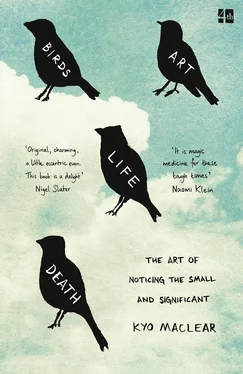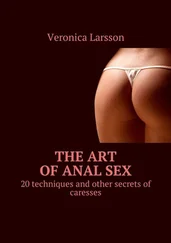I had always assumed grief was experienced purely as a sadness. My received images of grief came from art school and included portraits of keening women, mourners with heads bowed, hands to faces, weeping by candlelight. But anticipatory grief, I was surprised to learn, demanded a different image, a more alert posture. My job was to remain standing or sitting, monitoring all directions continually. Like the women who, according to legend, once paced the railed rooftop platforms of nineteenth-century North American coastal houses, watching the sea for incoming ships, hence earning those lookouts the name widow’s walk. I was on the lookout, scouring the horizon from every angle, for doom.
It was only later, when I read C. S. Lewis’s A Grief Observed , that I understood grief’s many guises and iterations. “No one ever told me that grief felt so like fear … Perhaps, more strictly, like suspense,” Lewis wrote. “Or like waiting; just hanging about waiting for something to happen. It gives life a permanently provisional feeling. It doesn’t seem worth starting anything. I can’t settle down.”
The grief I felt was not upending my life. It did not, for instance, prevent me from socializing and exercising and tracking down orange blossom water for a new cake recipe. It did not prevent me from lying in corpse pose in a crowded yoga studio, simulating my own proximity to the void. But it unmoored me and remained the subtext of my days.
One night I looked in the mirror and noticed my eyebrows were aloft. I tried to relax my face, make my brows those of a different, more carefree person. The next day, while sitting on the streetcar, I watched a woman whose eyebrows had been carefully pencilled in and thought how cartoonishly worried she looked with those skinny, fretful arcs. Like me, I thought, like everyone.
The worry was heavy and I tried to put it down. I tried to read my way out of it. I tried to distract myself from it. I tried to write my way through it. Ordinarily my art could withstand the pressures of life, the demands of young children and aging parents. But that year when the snow came early I discovered I had a wan and flimsy art, one that could be smacked down like a cheap sidewalk sign with the slightest emotional gust.
Or maybe I discovered something more fundamental: worry is a constriction. A mind narrows when it has too much to bear. Art is not born of unwanted constriction. Art wants formless and spacious quiet, anti-social daydreaming, time away from the consumptive volume of everyday life.
My relationship to time, my attitude towards it, grew fickle. I wanted an expanse of it. I wanted just a little. It moved too quickly. It crept too slowly. It was overly determined by forces outside myself. It overwhelmed me if I was left to define its shape. It was best late at night after my village slept. It was only good in the very early morning before the village awoke and the hours and minutes were set.
I had grown so accustomed to being interrupted by emergency calls and hospital news, I began interrupting myself whenever I sat down to work. I leapt up from my seat every half-hour as though an alarm had sounded. Time used to be deeper than this, I thought.
I studied the eyebrows of writers and artists I respected. I researched famous eyebrows. Frida. Audrey. Greta. Groucho. “Brows may be a map of the psyche,” reported one fashion magazine. I looked for the secret recipe (impeccable elegance, theatrical boldness, unkempt creativity, flirty merriment) that fed people and made them flourish. I wanted a road map back to my art and equanimity.
One morning while standing at a café counter staring at the magnificently thick brows of the man making my coffee, I discovered one should not gaze too long at faces unless one is prepared to fall in love again. As I watched the warm air of the coffee machine steam his eyeglasses, as I noticed him squint behind the fog, as he made a flower pattern in the foam of my coffee, I felt overcome with love. Faces have a near-unwatchable intimacy, particularly in a world in which everything perishes in the end. It is difficult to look as we choose, without emotional consequence.
Like me, the man looked very tired. What had he lost? What was he about to lose? Was he trying to get his grieving done ahead of schedule?
A few days later, I was charmed by a man at the gym and the thoughtful way he wiped down the treadmill for me. I was charmed by a chiropractor and the way my body flooded with endorphins when he leaned into his adjustment. I was charmed by the kindness of a stranger who let me slip in front of her at the grocery checkout. The professor, the café manager, the dog walker—I ran away with each of them in my mind, and this scared me because I come from a long line of philanderers. “Be careful,” whispered the guardian angel on my shoulder. “Remember how much you love your husband.”
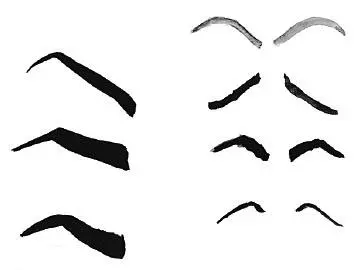
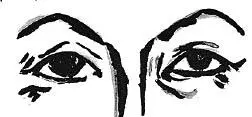
“Eybrows perpetually slightly raised” (Anne Carson)
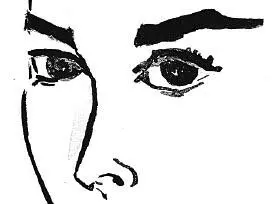
“The original queen of bold brows” (Audrey Hepburn)

Arching “his eyebrows about ten degrees” (Buster Keaton)
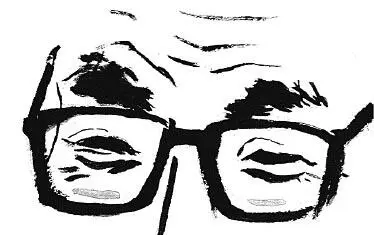
“Thick, black, expressive eyebrows” (Hayao Miyazaki)
I knew in my heart that I didn’t want to fall in love with another person. I wanted to fall in love with something bigger. Something that would hold me and my wandering mind. Something, like a love affair, that would allow me to say: I am here, I am alive. I am doing more than calmly bracing myself.
It was not enough to be a vigil flame, contained and burning around the clock.
As my days became increasingly plotted, I developed a bad case of wanderlust (Ger. wandern , to hike, and lust , desire).
I began to envy the literal wanderers, the ones out in the dark seas, or breaking away to hike up mountains and along the Pacific Crest trail. I dreamt of following footprints on a path, of going where the wild things are. But I had never been a Great Outdoors traveller. I was an urban person, a city-identified post-colonialist. The thought of pointing and gasping at something spectacularly beautiful on a warming planet felt dismal. Such was my state of mind. The feeling of pre-grief had made a home in my body. The shadow of an ending in my own family had made me alert to other endings.
Death is the definition of finitude. My wanderlust, I began to feel, was about finding my way back to infinity, back to the woods of a creative and contemplative mind.
I dreamt again of footprints on a path and realized when I awoke that it was not escape that I craved but guidance. For weeks, I sought instruction wherever I went. Please, YMCA lifeguard, will you coach me on my freestyle? Please, elaborately coiffed greengrocer, can you tell me how to cook these bitter greens? I wanted gifts of knowledge. I wanted company.
I wanted someone to lead the way forward and keep me going. Not a saviour but a guiding force. I was ready to imprint myself like a duckling.
Читать дальше
